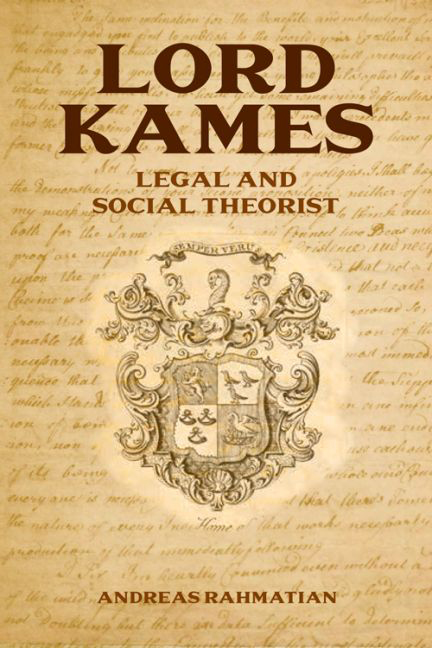Book contents
- Frontmatter
- Contents
- Preface
- Bibliography of Works by Lord Kames and Abbreviated References
- I Introduction
- II Aesthetics
- III Moral Philosophy I: Principles
- IV Moral Philosophy II: Development
- V Political Philosophy, Anthropology and Commerce
- VI Legal History, Legal Science and Comparative Law
- VII Property
- VIII Equity
- IX Obligations and Enforcement
- X Criminal Law
- XI Lord Kames's Influence on Some of the Founders of the United States
- XII A Critical Conclusion
- Bibliography
- Index
- Frontmatter
- Contents
- Preface
- Bibliography of Works by Lord Kames and Abbreviated References
- I Introduction
- II Aesthetics
- III Moral Philosophy I: Principles
- IV Moral Philosophy II: Development
- V Political Philosophy, Anthropology and Commerce
- VI Legal History, Legal Science and Comparative Law
- VII Property
- VIII Equity
- IX Obligations and Enforcement
- X Criminal Law
- XI Lord Kames's Influence on Some of the Founders of the United States
- XII A Critical Conclusion
- Bibliography
- Index
Summary
Modern Legal Concepts of Property
Property, both as a legal concept and as a historical, social and anthropological reality that passes through several stages of civilisation, forms a central part in Kames's thinking. It can be said that one of Kames's greatest and lasting contributions lies in his historical, legal and anthropological-sociological property theory. In line with his other writings, Kames presents his property theory in his characteristically mixed legal, socio-historical and conjectural philosophical style. Kames's property theory is not conveniently expounded systematically in one treatise, but scattered around in several works when their author found it appropriate to discuss theoretical aspects of property, mainly in the Historical Law-Tracts (1758), but also in the Essays upon Several Subjects concerning British Antiquities (1747), the Principles of Equity (1760), the Sketches of the History of Man (1774), and the Elucidations (1777), and that list is not complete. So the underlying theory and principles of property must be distilled and pieced together from several sources, and that invariably involves a considerable degree of interpretation which some readers may find unduly speculative. This necessarily ‘creative’ element in the rendering of Kames's ideas about property may also induce commentators on Kames's property theory to engage in their own philosophical arguments about property. It can then become dangerously unclear as to where Kames's property theory ends and where one's own property theory starts. I am at risk here myself, because my own property theory is fundamentally influenced by Lord Kames. This may show how rich, powerful and inspiring Kames's thinking about property still is, after 250 years, and it deserves a much more prominent position than at present in modern property theory discourse.
Before Kames's property theory is presented, it is necessary to discuss typical modern legal theories of property for the benefit of non-lawyers as well as lawyers, because many legal practitioners take property concepts for granted without much reflection. Emphasis is not on one specific theory of property, but on a pragmatic mixture which mirrors legal reality. That also presupposes an awareness of the two European property philosophies, one based on Roman law and found in Scotland and the European continent, and the other developed by English Common Law.
- Type
- Chapter
- Information
- Lord KamesLegal and Social Theorist, pp. 220 - 263Publisher: Edinburgh University PressPrint publication year: 2015



